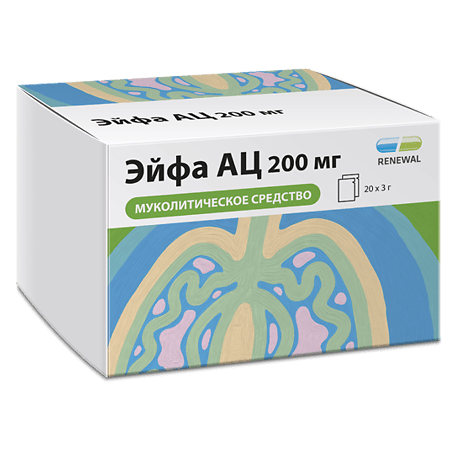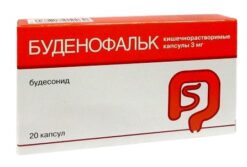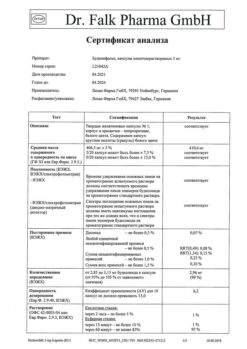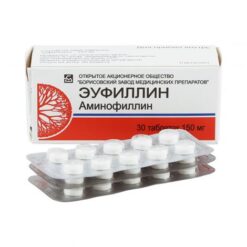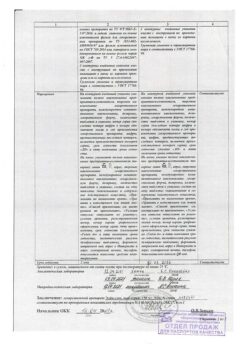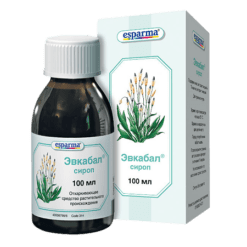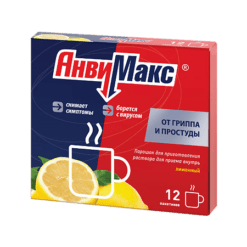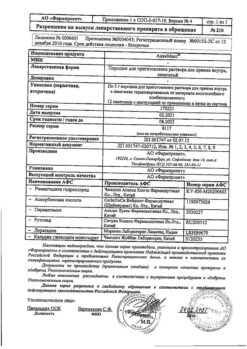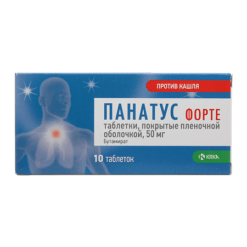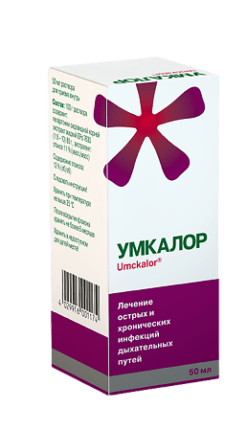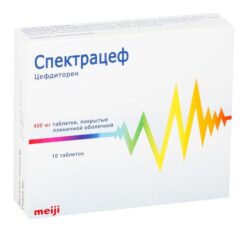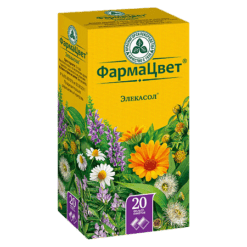No products in the cart.
Eifa AC, 200 mg 20 pcs
€3.84 €3.49
Description
The action is associated with the ability of free sulfhydryl groups of acetylcysteine to break intra- and intermolecular disulfide bonds of acidic mucopolysaccharides of sputum, which leads to depolymerization of mucoproteins and reduction of sputum viscosity.
In addition, acetylcysteine reduces induced hyperplasia of mucoid cells, increases production of surfactant compounds by stimulation of type II pneumocytes and stimulates mucociliary activity, which leads to improvement of mucociliary clearance.
Contains activity in purulent, mucopurulent and mucociliary sputum.
Acetylcysteine increases the secretion of less viscous sialomucin by bocalytic cells, reduces bacterial adhesion on the epithelial cells of the bronchial mucosa. It stimulates bronchial mucosa cells, the secretion of which lyses fibrin. Has a similar effect on the secretion produced by inflammatory diseases of ENT organs. It has an antioxidant effect due to the presence of SH-groups that can neutralize electrophilic oxidative toxins.
Acetylcysteine easily penetrates into the cell and is deacetylated to L-cysteine, from which intracellular glutathione is synthesized. Glutathione is a highly reactive tripeptide, a powerful antioxidant, cytoprotector that traps exogenous and endogenous free radicals and toxins. Acetylcysteine prevents depletion and promotes increased synthesis of intracellular glutathione that participates in redox processes of cells, thus contributing to detoxification of harmful substances. This explains the effect of acetylcysteine as an antidote in paracetamol poisoning. The main role of acetylcysteine is to maintain appropriate levels of glutathione concentration, thus providing cell protection.
Acetylcysteine protects alpha-1-antitrypsin (an elastase inhibitor) from inactivating effects of HOCL, an oxidizing agent produced by myeloperoxidase of active phagocytes. It also has anti-inflammatory effect (by inhibiting the formation of free radicals and active oxygen-containing substances responsible for the development of inflammation in lung tissue).
Indications
Indications
Acute and chronic respiratory diseases associated with the formation of viscous bronchial secretion (as an expectorant): bronchitis, tracheitis, bronchiolitis, pneumonia, bronchiectatic disease, cystic fibrosis, lung abscess, lung emphysema, laryngotracheitis, interstitial lung diseases, lung atelectasis (due to blockage of bronchi with mucous plugs).
Catarrhal and purulent otitis, maxillary sinusitis (relief of secretion).
Removal of viscous secretion from the airways in post-traumatic and post-operative conditions.
Active ingredient
Active ingredient
Composition
Composition
How to take, the dosage
How to take, the dosage
In the absence of other prescriptions, the following dosages are recommended:
Because of the high content of the active substance (200 mg acetylcysteine in the sachet), the drug should not be taken in children under 6 years of age. In this case, it is recommended to use Eifa AC in other dosages with a lower content of acetylcysteine.
Interaction
Interaction
Concomitant use of acetylcysteine with cough suppressants may increase sputum stasis due to suppression of the cough reflex.
When concomitant use with such antibiotics as tetracyclines (excluding doxycycline) ampicillin amphotericin B penicillins cephalosporins erythromycin may interact with the thiol group of acetylcysteine which leads to a decrease in activity of both drugs. Therefore, the interval between doses of these drugs should be at least 2 hours.
The simultaneous use of acetylcysteine and nitroglycerin may cause a significant decrease in blood pressure and headache.
The concomitant use of acetylcysteine and carbamazepine may cause subtherapeutic levels of carbamazepine.
Activated charcoal may decrease the effects of acetylcysteine.
Acetylcysteine eliminates the toxic effects of paracetamol.
Acetylcysteine can affect the results of colorimetric determination of salicylates.
Acetylcysteine may affect urinary ketone analysis.
Special Instructions
Special Instructions
Patients with bronchial asthma and obstructive bronchitis acetylcysteine should be prescribed with caution under systematic monitoring of bronchial patency. In case of treatment of patients with diabetes it must be taken into consideration that the preparation contains sucrose (1 sachet of Eifa AC 600 mg corresponds to 018 IU 200 mg corresponding to 023 IU 100 mg – 024 IU).
Acetylcysteine may slightly affect histamine metabolism; therefore, caution should be exercised when using the drug for long-term treatment of patients with histamine intolerance with symptoms of intolerance (headache, vasomotor rhinitis, itching).
When taking the drug, glassware should be used to avoid contact of the prepared drug with metals, rubber, oxygen and easily oxidized substances.
The use of the drug in patients with renal and/or hepatic impairment should be avoided to avoid additional nitrogen compounds. If the patient is unable to expectorate effectively, drainage or aspiration of the secretion should be performed.
The drug should not be taken immediately before bedtime (it is recommended to take the drug 4 hours before bedtime).
There are no data confirming the effect of acetylcysteine on the ability to operate vehicles and machinery.
Contraindications
Contraindications
Side effects
Side effects
According to the World Health Organization (WHO), adverse effects are classified according to their frequency of development as follows: Very common (â¥1/10); common (â¥1/100 to < 1/10); infrequent (â¥1/1000 to < 1/100); rare (â¥1/10000 to < 1/1000); very rare (< 1/10000); frequency unknown (frequency of the events cannot be determined from available data).
Cardiovascular disorders
. History of gastric and duodenal ulcers, esophageal varices, bronchial asthma, hepatic and/or renal insufficiency, adrenal disease, arterial hypertension, histamine intolerance (long-term use of the drug should be avoided because acetylcysteine affects histamine metabolism and may lead to signs of intolerance such as headache, vasomotor rhinitis, itching).
Overdose
Overdose
Acetylcysteine at a dose of 500 mg/kg/day does not cause signs and symptoms of overdose.
Symptoms: nausea, vomiting and diarrhea may occur.
Treatment: there is no specific antidote treatment is symptomatic.
Pregnancy use
Pregnancy use
Similarities
Similarities
Additional information
| Shelf life | 4 years. Do not use after the expiration date. |
|---|---|
| Conditions of storage | At a temperature not exceeding 25 ° C. Store out of the reach of children. |
| Manufacturer | Update PFC AO, Russia |
| Medication form | granules for preparation of oral solution |
| Brand | Update PFC AO |
Related products
Buy Eifa AC, 200 mg 20 pcs with delivery to USA, UK, Europe and over 120 other countries.

